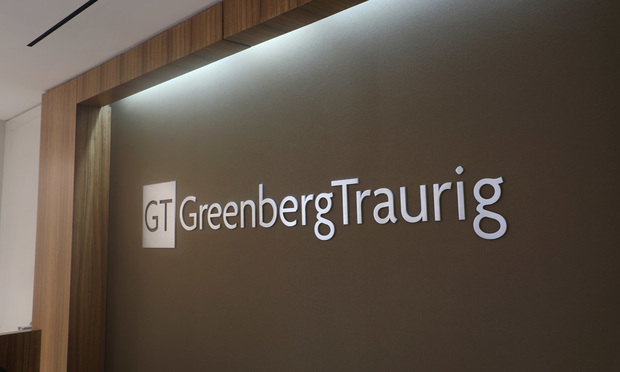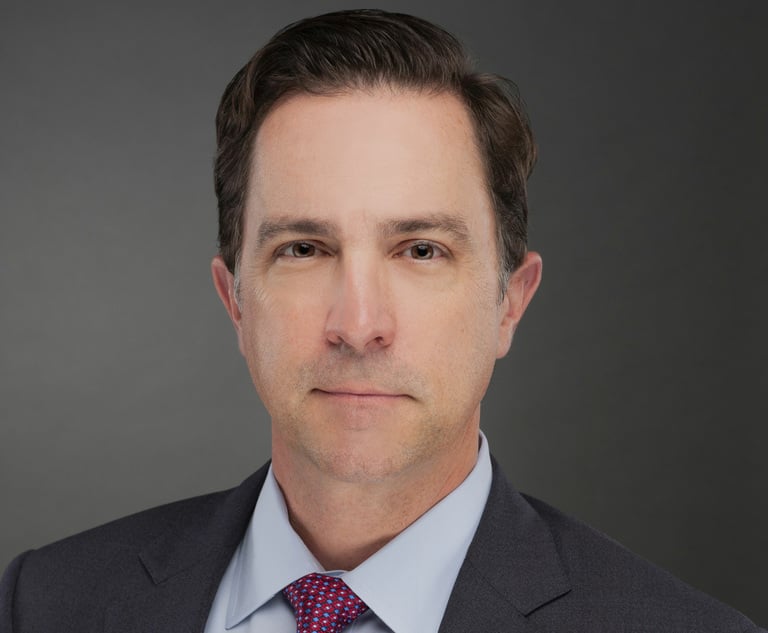Greenberg Traurig Seeks Dismissal of Claim It Aided Stanford Ponzi Scheme
Greenberg Traurig is asking a Dallas federal judge to dismiss an allegation that the law firm aided and abetted R. Allen Stanford in his massive Ponzi scheme, contending that the claim under which it was sued no longer exists in Texas.
December 06, 2018 at 04:43 PM
3 minute read
 Greenberg Traurig office. Photo by J. Albert Diaz
Greenberg Traurig office. Photo by J. Albert Diaz
Greenberg Traurig is asking a Dallas federal judge to dismiss an allegation that the law firm aided and abetted R. Allen Stanford in his massive Ponzi scheme, contending that the claim under which it was sued no longer exists in Texas.
The law firm was originally sued in a 2012 lawsuit before U.S. District Judge David Godbey by Ralph Janvey, a court-appointed receiver tasked with recovering $7 billion in funds swindled by Stanford, a former Houston financier found guilty of 13 fraud counts by a federal jury and sentenced to 110 years in prison.
The complaint in Janvey v. Greenberg Traurig alleges that the law firm helped Stanford shield his “offshore Ponzi bank” from regulatory scrutiny and deceived Stanford customers into believing his investment business was legitimate.
In 2014, Godbey dismissed some of the claims filed against Greenberg Traurig by the receiver but left intact a claim for “aiding, abetting, or participation in breaches of fiduciary duty.”
And in a motion before Godbey this week, Greenberg Traurig, a Miami-based firm with offices across the globe, including three in Texas, argues that the law on aiding and abetting in Texas has changed since he first ruled on their motion to dismiss.
The motion notes that in 2017, the Texas Supreme Court wrote in First United Pentecostal Church of Beaumont v. Parker that it never recognized a cause of action for aiding and abetting a breach of fiduciary duty or under the label “knowing participation.” The motion also noted that earlier this year, the U.S. Court of Appeals for the Fifth Circuit dismissed an aiding and abetting claim in In re DePuy Orthopaedics “because no such claim exists in Texas.”
“There can no longer be any confusion about whether the federal courts in this circuit can entertain an aiding and abetting claim,” according to the motion.
“The court need not be concerned that a dismissal of the aiding and abetting claim leaves the receiver without a remedy,” the motion continued. “The receiver's negligence claim—based on the same alleged Greenberg conduct seeking the same damages—remains in the case. The sole purpose of this motion is to streamline the ultimate submission of this case to the jury by removing a claim that no longer has any support in the law.”
Murray Fogler, a partner in Houston's Fogler, Brar, Ford, O'Neil & Gray who represents Greenberg Traurig, declined to comment on the motion.
Ed Snyder, a partner in San Antonio's Castillo Snyder who represents the receiver, said he will oppose Greenberg Traurig's motion to dismiss the aiding and abetting claim.
“It's been long-standing in Texas since 1942 that a cause of action for participation in breach of fiduciary duty has been recognized, and the Texas Supreme Court has never reversed its position on that,'' Snyder said.
Snyder said he has recovered in excess of $300 million in settlements with third-party litigants in the Stanford shareholder litigation, including a $63 million settlement earlier this year with Proskauer Rose.
This content has been archived. It is available through our partners, LexisNexis® and Bloomberg Law.
To view this content, please continue to their sites.
Not a Lexis Subscriber?
Subscribe Now
Not a Bloomberg Law Subscriber?
Subscribe Now
NOT FOR REPRINT
© 2025 ALM Global, LLC, All Rights Reserved. Request academic re-use from www.copyright.com. All other uses, submit a request to [email protected]. For more information visit Asset & Logo Licensing.
You Might Like
View All
O'Melveny, White & Case, Skadden Beef Up in Texas With Energy, Real Estate Lateral Partner Hires
5 minute read
Chamberlain Hrdlicka Taps a New Leader as Firm Follows Succession Planning Path
3 minute read

Trending Stories
- 1‘High Demand’: Former Trump Admin Lawyers Leverage Connections for Big Law Work, Jobs
- 2Considerations for Establishing or Denying a Texas Partnership to Invest in Real Estate
- 3In-House AI Adoption Stalls Despite Rising Business Pressures
- 4Texas Asks Trump DOJ to Reject Housing Enforcement
- 5Ideas We Should Borrow: A Legislative Wishlist for NJ Trusts and Estates
Who Got The Work
J. Brugh Lower of Gibbons has entered an appearance for industrial equipment supplier Devco Corporation in a pending trademark infringement lawsuit. The suit, accusing the defendant of selling knock-off Graco products, was filed Dec. 18 in New Jersey District Court by Rivkin Radler on behalf of Graco Inc. and Graco Minnesota. The case, assigned to U.S. District Judge Zahid N. Quraishi, is 3:24-cv-11294, Graco Inc. et al v. Devco Corporation.
Who Got The Work
Rebecca Maller-Stein and Kent A. Yalowitz of Arnold & Porter Kaye Scholer have entered their appearances for Hanaco Venture Capital and its executives, Lior Prosor and David Frankel, in a pending securities lawsuit. The action, filed on Dec. 24 in New York Southern District Court by Zell, Aron & Co. on behalf of Goldeneye Advisors, accuses the defendants of negligently and fraudulently managing the plaintiff's $1 million investment. The case, assigned to U.S. District Judge Vernon S. Broderick, is 1:24-cv-09918, Goldeneye Advisors, LLC v. Hanaco Venture Capital, Ltd. et al.
Who Got The Work
Attorneys from A&O Shearman has stepped in as defense counsel for Toronto-Dominion Bank and other defendants in a pending securities class action. The suit, filed Dec. 11 in New York Southern District Court by Bleichmar Fonti & Auld, accuses the defendants of concealing the bank's 'pervasive' deficiencies in regards to its compliance with the Bank Secrecy Act and the quality of its anti-money laundering controls. The case, assigned to U.S. District Judge Arun Subramanian, is 1:24-cv-09445, Gonzalez v. The Toronto-Dominion Bank et al.
Who Got The Work
Crown Castle International, a Pennsylvania company providing shared communications infrastructure, has turned to Luke D. Wolf of Gordon Rees Scully Mansukhani to fend off a pending breach-of-contract lawsuit. The court action, filed Nov. 25 in Michigan Eastern District Court by Hooper Hathaway PC on behalf of The Town Residences LLC, accuses Crown Castle of failing to transfer approximately $30,000 in utility payments from T-Mobile in breach of a roof-top lease and assignment agreement. The case, assigned to U.S. District Judge Susan K. Declercq, is 2:24-cv-13131, The Town Residences LLC v. T-Mobile US, Inc. et al.
Who Got The Work
Wilfred P. Coronato and Daniel M. Schwartz of McCarter & English have stepped in as defense counsel to Electrolux Home Products Inc. in a pending product liability lawsuit. The court action, filed Nov. 26 in New York Eastern District Court by Poulos Lopiccolo PC and Nagel Rice LLP on behalf of David Stern, alleges that the defendant's refrigerators’ drawers and shelving repeatedly break and fall apart within months after purchase. The case, assigned to U.S. District Judge Joan M. Azrack, is 2:24-cv-08204, Stern v. Electrolux Home Products, Inc.
Featured Firms
Law Offices of Gary Martin Hays & Associates, P.C.
(470) 294-1674
Law Offices of Mark E. Salomone
(857) 444-6468
Smith & Hassler
(713) 739-1250






